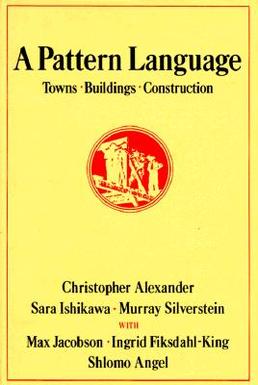I just learned that Alan Cooper, the person who created Visual Basic drag-drop GUI interface and plugin components never worked for Microsoft. He was directly influenced by "Patterns" from Christopher Alexander, the same that influenced creation of software design patterns, wiki, agile etc. VB was an environment that can make user productive in minutes, enabling success of Windows as application platform.
Alan C. said "Design is not art; it is problem solving based on first principles, patterns."
C. Alexander says "Architecture is about synthesizing form to satisfy the context."
It is a philosophy of design.
"Architecture is solving a problem that people in the real world have."
Some people really change the world. It is all connected :-)
"Everyone wants change, but nobody wants to change." - Alan Cooper
Triangulation 262 Alan Cooper | TWiT
Alan Cooper - Wikipedia
Visual Basic - Wikipedia

Alan Cooper | Cooper
Christopher Alexander - Wikipedia
"Reasoning that users are more sensitive to their needs than any architect could be, he produced and validated a "pattern language" to empower anyone to design and build at any scale."
A Pattern Language - Wikipedia
 "The book creates a new language, what the authors call a pattern language derived from timeless entities called patterns... All 253 patterns together form a language." Patterns describe a problem and then offer a solution. In doing so the authors intend to give ordinary people, not only professionals, a way to work with their neighbors to improve a town or neighborhood, design a house for themselves or work with colleagues to design an office, workshop or public building such as a school."
"The book creates a new language, what the authors call a pattern language derived from timeless entities called patterns... All 253 patterns together form a language." Patterns describe a problem and then offer a solution. In doing so the authors intend to give ordinary people, not only professionals, a way to work with their neighbors to improve a town or neighborhood, design a house for themselves or work with colleagues to design an office, workshop or public building such as a school."
PatternLanguage.com
book: A_Pattern_Language.pdf (1218 pages!)
Free E-book Download: Christopher Alexander's Classic "A Pattern Language"
Notes on the Synthesis of Form (Harvard Paperbacks): Christopher Alexander: 9780674627512: Amazon.com: Books
"We are on the brink of times when man may be able to magnify his intellectual and inventive capability, just as in the nineteenth century he used machines to magnify his physical capacity"
- Christopher Alexander
Alan C. said "Design is not art; it is problem solving based on first principles, patterns."
C. Alexander says "Architecture is about synthesizing form to satisfy the context."
It is a philosophy of design.
"Architecture is solving a problem that people in the real world have."
Some people really change the world. It is all connected :-)
"Everyone wants change, but nobody wants to change." - Alan Cooper
Triangulation 262 Alan Cooper | TWiT
Alan Cooper - Wikipedia
Visual Basic - Wikipedia

Alan Cooper | Cooper
Christopher Alexander - Wikipedia
"Reasoning that users are more sensitive to their needs than any architect could be, he produced and validated a "pattern language" to empower anyone to design and build at any scale."
A Pattern Language - Wikipedia
 "The book creates a new language, what the authors call a pattern language derived from timeless entities called patterns... All 253 patterns together form a language." Patterns describe a problem and then offer a solution. In doing so the authors intend to give ordinary people, not only professionals, a way to work with their neighbors to improve a town or neighborhood, design a house for themselves or work with colleagues to design an office, workshop or public building such as a school."
"The book creates a new language, what the authors call a pattern language derived from timeless entities called patterns... All 253 patterns together form a language." Patterns describe a problem and then offer a solution. In doing so the authors intend to give ordinary people, not only professionals, a way to work with their neighbors to improve a town or neighborhood, design a house for themselves or work with colleagues to design an office, workshop or public building such as a school."PatternLanguage.com
book: A_Pattern_Language.pdf (1218 pages!)
Free E-book Download: Christopher Alexander's Classic "A Pattern Language"
Notes on the Synthesis of Form (Harvard Paperbacks): Christopher Alexander: 9780674627512: Amazon.com: Books
"We are on the brink of times when man may be able to magnify his intellectual and inventive capability, just as in the nineteenth century he used machines to magnify his physical capacity"
- Christopher Alexander
No comments:
Post a Comment